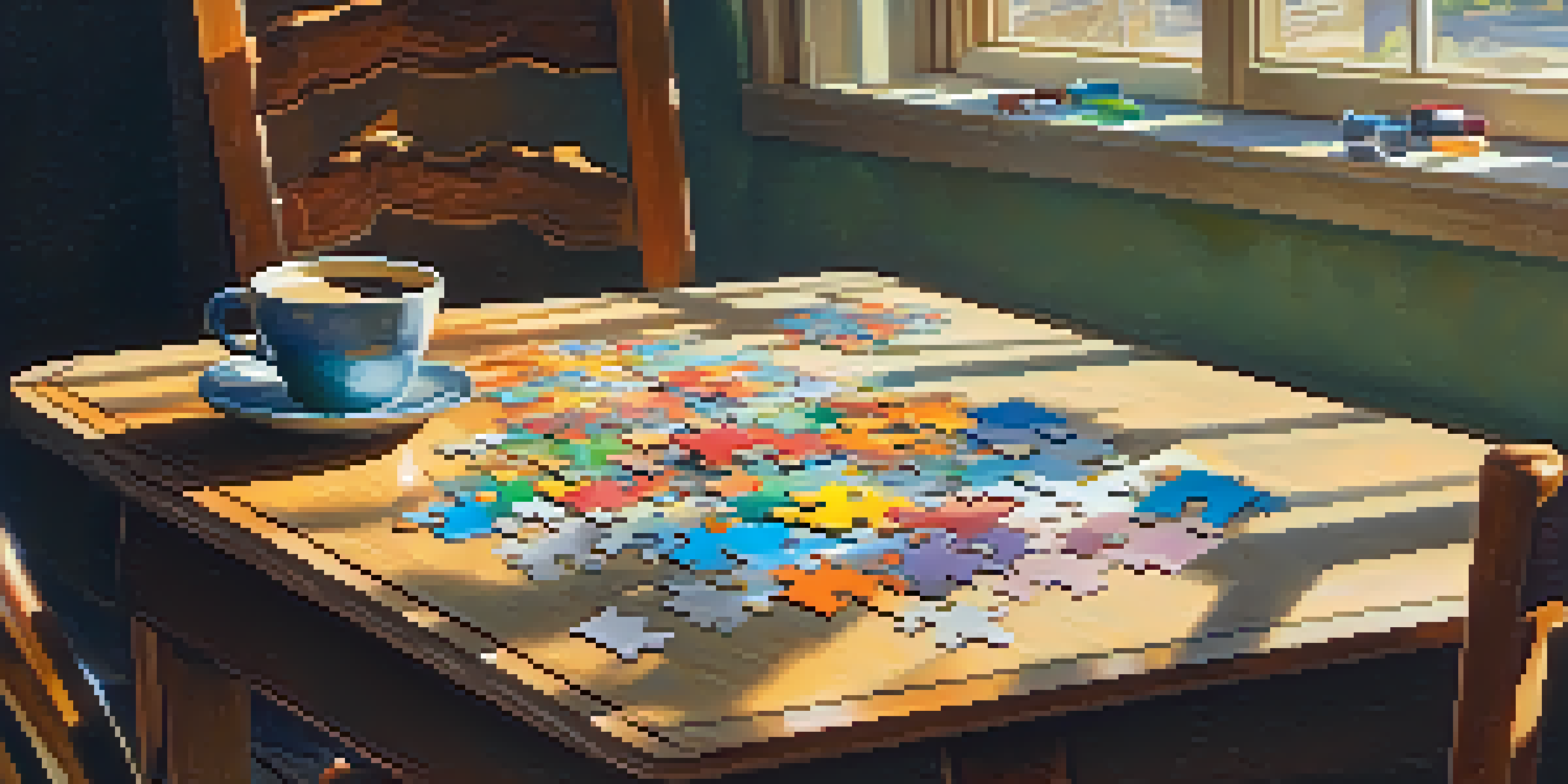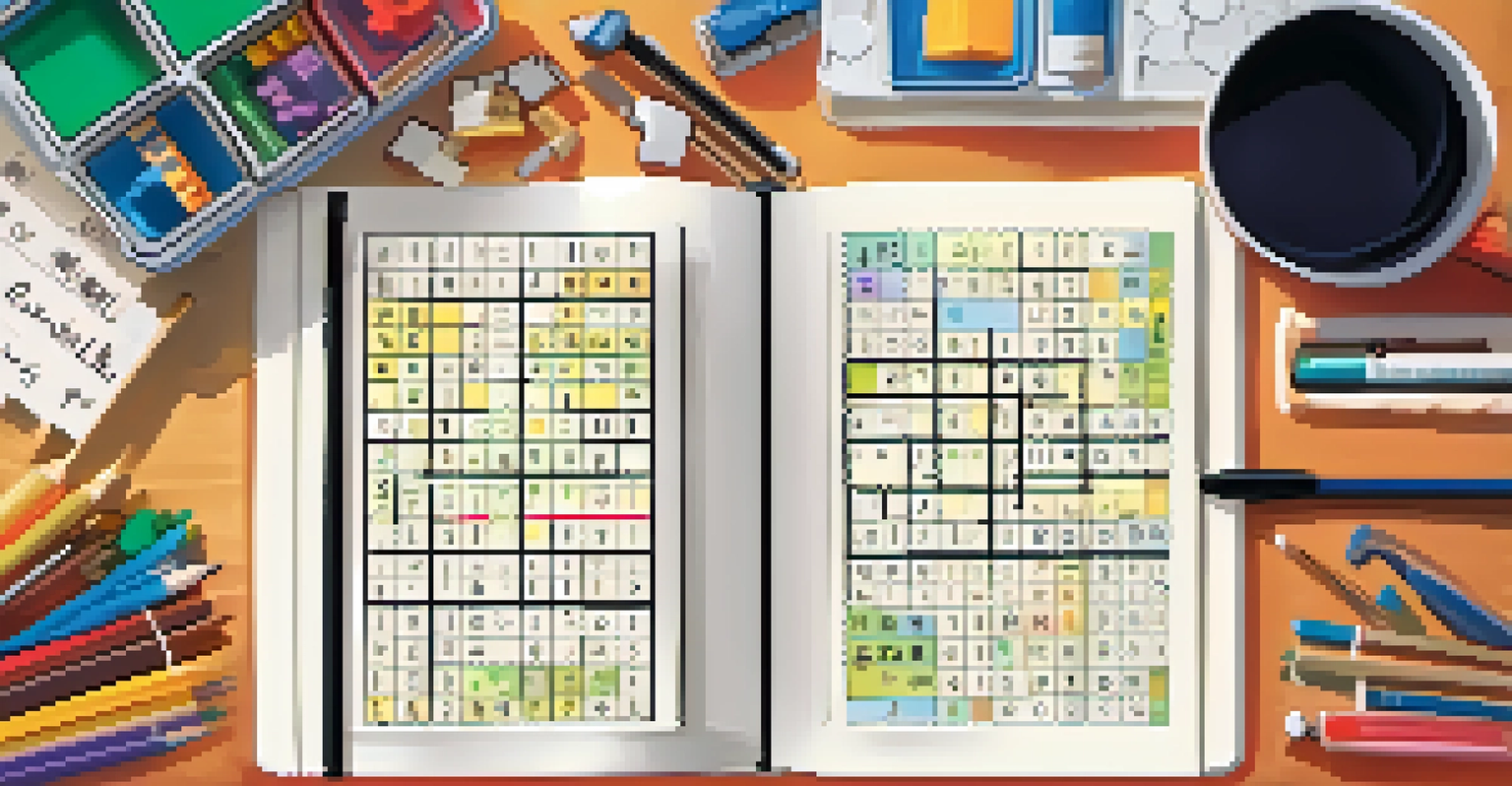Puzzle Solving Strategies: Tips to Improve Your Skills

Understand the Puzzle's Structure and Rules
Before diving into a puzzle, take a moment to understand its structure and the rules that govern it. This foundational knowledge can save you time and frustration later on. For instance, in a jigsaw puzzle, recognizing the number of pieces and their shapes can give you a head start.
Success is the sum of small efforts, repeated day in and day out.
Similarly, in logic puzzles, knowing how the clues interrelate is crucial. By grasping the underlying mechanics, you can approach the puzzle more systematically, which can lead to quicker solutions.
Taking a few minutes to familiarize yourself with the puzzle can feel tedious, but it’s akin to reading the instructions before assembling furniture. This initial investment pays off in the long run.
Break the Puzzle into Manageable Parts
Tackling a large puzzle can be daunting, so breaking it down into smaller, manageable sections is a smart strategy. For example, when working on a crossword puzzle, you might start by filling in the easier clues first to build confidence.

This method not only makes the task feel less overwhelming but also allows you to gain momentum. As you fill in sections, you might find that other clues become apparent, like pieces of a bigger picture coming together.
Understand Puzzle Rules First
Taking time to grasp the structure and rules of a puzzle can significantly enhance your problem-solving efficiency.
Think of it like climbing a mountain: you wouldn’t try to leap to the summit in one go. Instead, you’d take it step by step, stopping to enjoy the view as you ascend.
Use a Variety of Approaches
Different puzzles often require different strategies, so don’t hesitate to experiment with various approaches. For example, if you're stuck on a Sudoku, try using the process of elimination for certain numbers instead of just guessing.
The only way to learn mathematics is to do mathematics.
By employing diverse techniques, you’ll not only enhance your problem-solving toolkit but also keep the experience fresh and engaging. This variety can transform a frustrating session into a fun challenge.
Think of it like cooking; sometimes a pinch of this and a dash of that can create a delightful dish, whereas sticking to one ingredient might leave you with a bland meal.
Practice Regularly to Build Your Skills
Like any skill, puzzle-solving improves with regular practice. The more puzzles you tackle, the more strategies you’ll develop and refine. This consistent engagement can lead to a noticeable boost in your confidence and speed.
Consider setting aside time each week to work on different types of puzzles. Whether it’s crosswords, jigsaws, or logic problems, variety will keep your mind sharp and versatile.
Break It Down for Success
Dividing a large puzzle into smaller, manageable sections makes the task feel less overwhelming and helps build momentum.
Just as athletes train to improve their performance, puzzle enthusiasts should embrace practice as a pathway to mastery.
Stay Patient and Persistent
Puzzle-solving can be frustrating, especially when you hit a wall. It’s essential to cultivate patience and persistence. Remember, every puzzler faces challenges; the key is to keep pushing through.
Taking breaks when you feel stuck can be beneficial. Sometimes, stepping away allows your mind to subconsciously work on the puzzle, leading to breakthroughs when you return.
Think of it like a marathon; the finish line may seem far away, but with determination and a steady pace, you’ll eventually cross it.
Learn from Your Mistakes
Mistakes are part of the learning process, so don’t shy away from them. When you make an error in a puzzle, take a moment to analyze what went wrong. This reflection can deepen your understanding and help prevent similar mistakes in the future.
For instance, if you misplace a jigsaw piece, consider why it seemed to fit. Did you misread the colors or shapes? Learning from these hiccups can turn setbacks into stepping stones.
Practice for Improvement
Regularly engaging with different types of puzzles can refine your skills and boost your confidence in solving them.
Like a scientist conducting experiments, each failure can lead to valuable insights that refine your approach.
Collaborate with Others for New Insights
Collaborating with friends or joining puzzle clubs can provide new perspectives and insights. Sharing strategies or discussing approaches can open up avenues you may not have considered on your own.
When puzzling with others, you can bounce ideas off one another, which can spark creativity and enhance problem-solving skills. It’s like brainstorming together to solve a mystery.

Think of it as a team sport; even the best players often benefit from collaboration and support to reach their goals.
Celebrate Your Progress and Achievements
As you improve your puzzle-solving skills, take time to celebrate your progress. Whether it’s finishing a particularly challenging puzzle or mastering a new technique, acknowledging these milestones can boost your motivation.
Consider keeping a journal of your achievements or sharing them with friends. Celebrating small victories along the way can make the journey much more enjoyable.
Just like a student who feels proud of their grades, recognizing your growth in puzzle-solving can inspire you to tackle even bigger challenges ahead.